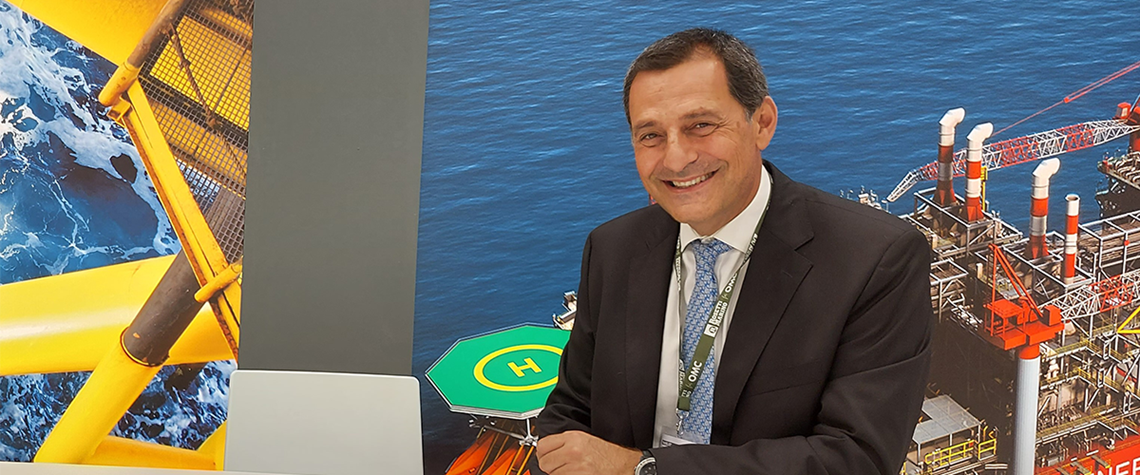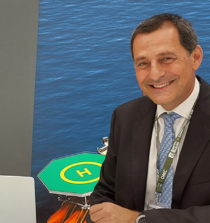Morocco is on the brink of developing its biggest gas discovery to date, following Energean’s farm-in to offshore acreage previously controlled by AIM-listed Chariot Energy. Everything now depends on the results of an appraisal well to be drilled this summer, according to Energean CEO Mathios Rigas in an exclusive interview with Petroleum Economist.
London-listed FTSE 250 independent Energean has made impressive progress in developing assets that today supply around half of Israel’s gas from the offshore Karish field, where it has installed an FPSO and constructed a pipeline to shore.
Having just completed its farm-in to offshore assets in Morocco—and assumed operatorship—Energean is hoping to replicate that success in a country heavily dependent on coal for its electricity supply, despite ongoing efforts to build substantial renewable wind and solar power capacity.
Morocco could eliminate its dependence on coal, slash its carbon dioxide emissions and become an exporter of gas to the lucrative European market
The proposed Anchois development in the Lixus licence is not only Morocco’s largest discovery to date, it could form the basis for infrastructure that would make other, smaller resources viable. Energean has also farmed into the Rissana licence.
If all goes to plan, Morocco could eliminate its dependence on coal, slash its carbon dioxide emissions and become an exporter of gas to the lucrative European market.
Everything now hinges on an appraisal well that Energean and its partners are gearing up to drill this summer in the Lixus licence. A successful outcome could see FID on the Anchois development before the end of this year.
You have just completed a deal to farm into and operate offshore assets in Morocco. Energean has been focusing its efforts mainly on gas in Israel. What attracted you to Morocco?
Rigas: Morocco has an excellent fiscal regime—stable with a ten-year tax holiday. It also has a government entity, ONHYM, as a 25% partner—ensuring state support. That played a major role in attracting us. This is also a message to other countries. If you want to attract investors to exploit your hydrocarbon potential, you need an attractive and stable fiscal regime.
This was something we liked in Israel, which went through a phase of restructuring fiscal terms—with the famous Sheshinski tax—but is now a good place to do business, despite the war. We have invested close to $2b to help Israel become energy independent, with a competitive gas market that has displaced coal. We want to repeat that in Morocco.
The situation in Morocco is very similar to when we took the FID to invest in Israel’s Karish field in 2018. It is a discovered gas resource in a market served predominantly by coal, with gas imported from Spain. Israel had coal-fired power generation and was importing gas from Egypt.
The Moroccan government wants to decarbonise, displacing coal with gas, and to become energy independent and potentially a gas exporter. For us, it is a natural step outside of Israel. We have signed a rig contract with Stena, the same company that drilled our wells in Israel.
What about the resource itself?
Rigas: Morocco’s resources need to be confirmed with the appraisal well we intend to spud this summer. That is critical to assess production potential and reservoir deliverability. We are targeting a wide range of resource: anything between 0.5tcf and 1.5tcf.
A big difference with Israel is the gas price environment in Morocco, which makes a discovery of a tcf or more attractive economically, especially with the excellent fiscal terms. You can have a nice development with a lot less resource than in the East Mediterranean.
How dependent is a positive FID on the Anchois project on the well you plan to drill this summer?
Rigas: We are drilling the well because we believe in the potential. If the results are disappointing, we will have to reassess the economics, because development costs are rising. A lot will depend on the gas price the government or gas offtakers are willing to commit to.
Assuming the Anchois project goes ahead as you expect, what would that mean for Morocco?
Rigas: If we are at the upper end of the estimate, we could be looking at a complete replacement of coal-fired power generation. Moreover, Morocco has a pipeline to Spain so excess gas could be easily exported. That is a big difference with Israel, where the only export market we are connected to is Egypt.

Assuming results are on the high side of estimates, how would Anchois development be financed?
We have farmed in with a 45% stake. ONHYM has 25% and the balance is Chariot. Every partner would need to bring in their own financing, whether through equity or debt.
In parallel with planning the appraisal well, we are working on a development scheme similar to the one that Chariot worked on: a subsea tieback to an onshore gas processing plant that is tied to the gas network. We are updating costs and we are in discussions with potential gas offtakers—both government and private.
“Anchois is the biggest discovery so far in Morocco“
When the well tests are known, we will be able to bring everything together: the development scheme, costs, gas offtake and financing. If we have the results in the third quarter, we should be able to take FID before the end of this year.
It could be a billion-dollar project, including the drilling, the subsea, the pipelines and the onshore terminal. This is a number we will have to reconfirm once the well has been drilled.
What plans do you have for the other acreage you farmed into, the Rissana licence? And what plans do you have to extend your position further in Morocco, given that the country is underexplored.
Rigas: Anchois is the biggest discovery so far in Morocco. The country is supporting exploration for hydrocarbons, and we believe there is a lot more potential. That is why we farmed into the Rissana licence. The plan there, after the results of the Anchois well, is potentially to drill a well.
What is missing in Morocco today is offshore infrastructure. In Israel, we put in place an FPSO and a pipeline that allow smaller discoveries to be commercialised. If we put in place infrastructure on the back of the Anchois development, other discoveries could become commercial even if they are not large-scale. Half a tcf without infrastructure is not viable, but half a tcf next to existing infrastructure is a valuable asset.
You have talked about “the potential for exports for any surplus supply”. That would be a turnaround for Morocco, which imports 90% of its gas. How hopeful are you that it might become a gas exporter?
Rigas: When you find gas, first of all the country consumes what it needs for its own power generation. But then the existence of locally produced gas enhances the ability of the industry to generate other investments. Once gas lands on the shores of Morocco, we will see more activity on the industrial side.
The country is already talking about changing its energy mix, not only for power generation but also for transportation— CNG for cars, trucks and buses.
The existence of the pipeline to Spain will supplement local consumption and help us to make the project bankable. In Israel, we had 15-year fixed contracts with the big private power generation companies that allowed us to raise $1.3b of project finance debt. This is critical also in Morocco. Exports at European gas prices would encourage banks to finance the project.
It is clear that a lot depends on the well you are about to drill. What would represent success?
Rigas: Permits are in place, so we are ready to start. We have the service contracts, the rig contract, and our team is working on logistics. We have got the best track record in the Mediterranean of any operator for drilling safely and at low cost.
Success depends on the final volumes and deliverability of the reservoir. If we are at the middle or higher end of the estimates I mentioned earlier, it will be a successful operation. Less than a tcf would not be a disappointment, but it would require a higher gas price. With half a tcf or less it starts to get marginal.
Around two-thirds of your production is in Israel. How has your business been affected by the war between Israel and Hamas and the recent developments in the long-running antagonism between Iran and Israel?
Rigas: So far there has not been any impact. We keep producing at the rates the market has contracted from us. We have backup plans to involve Cyprus in case the airports in Israel are closed for whatever reason. We do not get involved in politics.
“What is affecting gas sales is the weather“
We are a UK-listed FTSE 250 company, so investors are concerned and we are in communication with them. We feel confident about the physical protection of the assets by the Israel Defense Forces because it is a critical piece of infrastructure for the country.
What is affecting gas sales is the weather. We had a very mild winter, and so we had lower consumption. We will see what the summer brings. If we have the extreme heat that some people predict, and air-conditioning runs at peak rates, we will more than compensate. Overall, we are on track for the production guidance in our last trading update.
You recently described Energean as “the leading independent gas-focused exploration, development and production company in the Mediterranean region” and said that 2023 was a major year in terms of production volumes and credibility. What ambitions do you have for the company?
Rigas: Energean in 2018 was producing only 1,500–2,000b/d of oil from a Greek asset called Prinos. In 2024, Energean is producing close to 170,000 boe/d and is present in seven countries, with production coming predominantly from our flagship asset in Israel—the Karish field—but also from Italy, Egypt, Greece, Croatia and the UK.
Last year was transformational because we had a full year of production from Israel. It is probably a unique situation to see an independent deliver a project of that magnitude, owning it 100%, operating it, financing it, signing all the gas contracts and delivering an FPSO that works. On top of everything else, that project happened in the middle of Covid, when we could not visit the shipyards in China and Singapore.
Our FPSO is working at 99.5% uptime, and we have delivered a $2b project that supplies more than 50% of Israel’s gas needs without any partner. This industry has opportunities for companies that are nimble, committed and able to deliver on their promises. Sometimes, the majors are too big for projects of this size.
Where do you go from here?
Rigas: We have a target to reach 200,000boe/d from our existing projects in Israel, Italy, Egypt, Greece and Croatia, and we are firmly on track to achieve that number.
We continue our strategy to grow into the gas space. The Moroccan project is a first step outside our existing countries of operation. If we see other opportunities—like in Morocco—we will grab them and develop gas for any country that wants us to.








